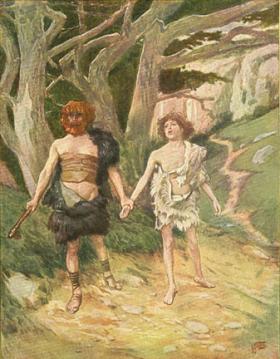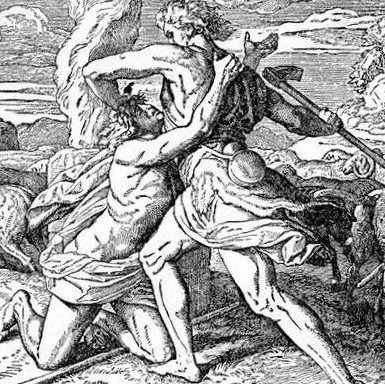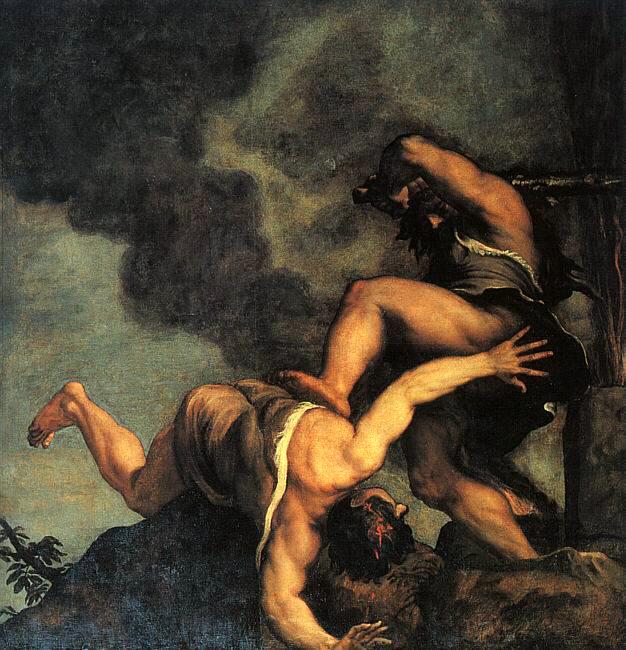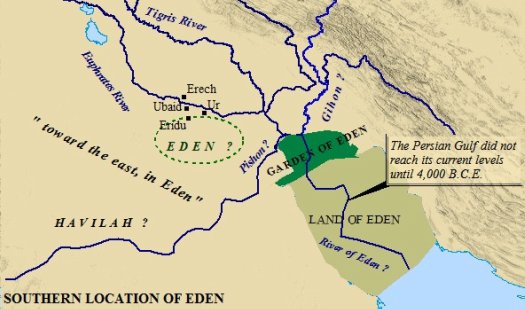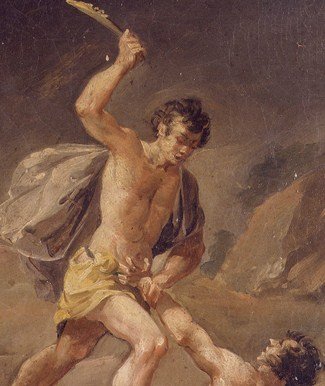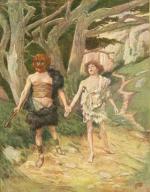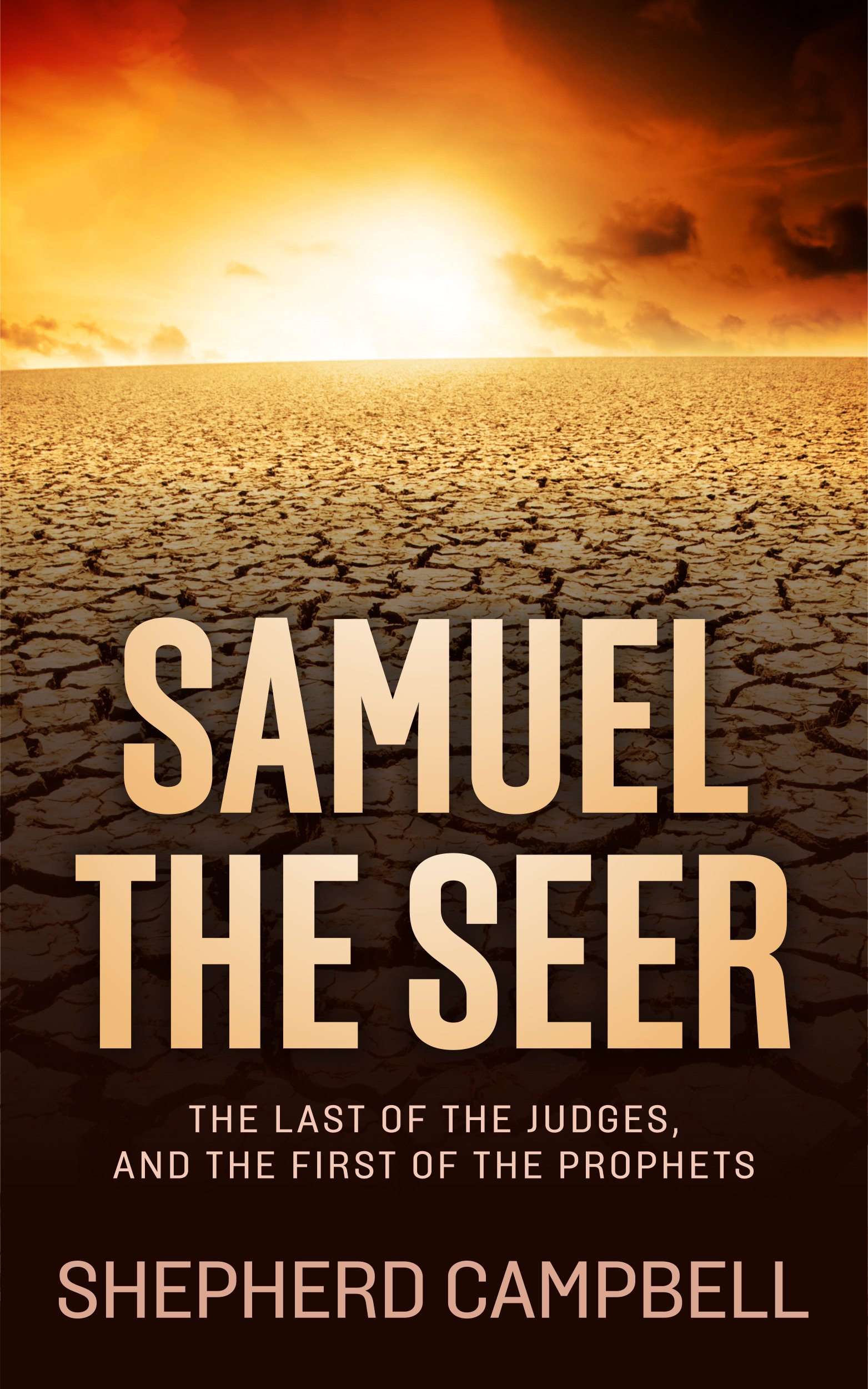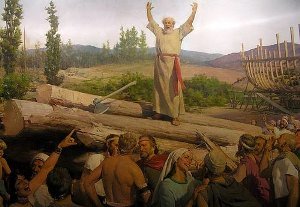- Biblical Maps
- Home Page
- History of Israel Blog
- Ancient Mesopotamia
- Map of Palestine
- Abraham
- Ancient Israel
- 12 Tribes of Israel
- Jerusalem
- The Book of Isaiah
- Palestine
- The Habiru
- Contact Us
- Bible Study Forums
- Media Page
- Visitors Sitemap
- Privacy Policy
- The History of the Old Testament
- In the Days of Noah
- The City of Jericho
VISIT OUR FACEBOOK PAGE!
Cain and Abel
Cain and Abel
The story of these two brothers is one of the most popular stories in
all of the Bible. In the book of Genesis, two genealogical lines become
very important.
The line of Adam and the line of Noah. Each Patriarch produced a line of descendants fundamental in the early stages of Israel's development.
The genealogical line of Adam is, naturally, the first which appears in the Bible. Three sons of Adam and Eve are mentioned in the early chapters of Genesis. The lineage from these sons forms two lines of descendants that are very different from each other.
These two lines are seen initially in Cain and Able. The opening verses of Genesis 4 introduced Cain as the first born. Cain was a "tiller of the ground". The younger brother, Abel, was a "keeper of flocks", or, a shepherd.
It is interesting to note that Adam is believed to have had 56 children; 33 sons, and 23 daughters. Why God choose Abel and Cain is never said.
Abel
Between Cain and Abel, a distinct difference in profession is first mentioned. Genesis 4:2 gives the first bit of details concerning Cain and Abel.
"And Abel was a keeper of the flocks, but Cain was a tiller of the ground."
God had made it clear to man he was not to eat flesh (Gen. 1:29; Gen. 2:16; Gen. 3:19). Abel's sheep would have been for commercial and spiritual use.
He undoubtedly made his sheep available to local merchants and farmers through purchase and trade. He may have even supplied others with his sheep for worship of the Almighty God.
Further development of Abel's character is given in the New Testament. Hebrews 11:4 mentions Abel among the Bible's most faithful and Godly men. The divide between Cain and Abel was a deep one.
"By faith Abel offered to God a better sacrifice than Cain, through which he obtained the testimony that he was righteous, God testifying about his faith, and through faith, though he is dead, he still speaks."
In Matthew 23:35 Jesus Christ calls him "righteous Abel". He was a righteous man, with purity of heart. Luke also described Abel as righteous, and even as a prophet ( Lk. 11:50-51 ).
The promised Messiah will emerge from the "seed of the woman" established in Genesis 3 with Adam and Eve's original sin. The tension and conflict was set in motion. The seed of the serpent and the seed of the woman would continually be at odds.
It is through Able the promised seed of the woman would be transmitted to the next generation. God intends to establish His people, restore humanity, and ultimately establish His kingdom on earth. Paradise would be restored, and the promised Messiah would be the instrument to do so. The story of Cain and Abel foreshadow many of these messianic themes found throughout the Bible.
Ancient Israel starts with Abel. The seed of the serpent, though, never relents. The story of Cain and Abel is Satan's first attempt to thwart God's redemptive plan by destroying the "seed of the woman". Cain becomes Satan's new instrument to accomplish this mission.
Abel was a man who obeyed God. As a prophet, he must have also received God's Word directly through divine experience. Between Cain and Abel, there is no doubt as to which one sought after the Lord more than the other. Abel was the more spiritually concerned.
Abel's spiritual nature emphasizes his profession as a shepherd. Abel tended his flock with the greatest of care, for their ultimate purpose was to be a divine offering to God Almighty. Abel truly toiled for God's honor. His sheep were holy sheep.
God's promised "seed of the woman" was intended to stem from the descendants of Abel and Cain. Abel is of the "seed of the woman". This is the seed that will carry God's words and commandments, and the seed of Ancient Israel that would form the nation as it is today.
The promised coming Messiah is of the "seed of the woman". It is through Abel that God intends to establish His people, restore humanity, and ultimately establish His kingdom. The story of Cain and Abel foreshadow many of the themes found throughout the Bible.
Ancient Israel starts with Abel. The seed of the serpent, though, never relents. The story of Cain and Abel developed into Satan's first attempt to thwart the "seed of the woman", and corrupt mankind.
Cain
A distinctly different personality is seen in Abel's older brother, Cain. The Hebrew word for Cain is Qanah. This translates as; to erect; to create; to procure; to own. Cain's profession was as a "tiller of the ground".
The Hebrew word translated "tiller" is an interesting word. The Hebrew "Abad", has a number of different uses and translations in the Old Testament.
It is used 290 times in the Old Testament. However, the general meaning of the word is a notion of service. It can be service to God, object, people, land, etc.
The nature of the service, though, varies widely. Abad can denote a service of worship, as to God. However, many of its meanings imply enslavement, forced service, to compel, and to keep in bondage. This may be illuminating as Cain's nature develops.
Flavius Josephus also illuminates the difference in character between Cain and Abel. He described Cain in his Jewish Antiquities. Though Josephus' works should be taken with a grain of salt, he often illuminates Jewish traditions from antiquity. He relates Cain "was not only only very wicked in other respects, but was wholly intent upon getting".
Do you have an idea as to what the mark of Cain was? Why do you think God refused Cain's sacrifice? Click on the above link and give us your insights, thoughts, questions, and comments concerning the story of Cain and Abel!
Genesis 4:3-5
"So it came about in the course of time that Cain brought an offering to the of the fruit of the ground. And Abel, on his part also brought of the firstlings of his flock and of their fat portions. And the Lord had regard for Abel and for his offering; but for Cain and for his offering He had no regard. So Cain became very angry and his countenance fell."
Obviously Adam and his people were worshiping God even after the expulsion from Eden. Throughout the history of Israel, God has always provided opportunities to meet with His people. It would seem God had appointed times to meet with Cain and Abel individually, at which point they would offer sacrifices.
Scholars believe Cain and Abel were grown men by the time of this sacrifice. Adam and Eve had been told to multiply, so Abel and Cain likely had many brothers and sisters, and other extended members.
This may help explain how Cain and Abel diverged so widely from each other. They both had been brought up in the commands of God. However, they had become grown men, and formed their own attitudes and beliefs. They were brothers, but also members of a much larger, diverse family as well. As stated above, Cain and Abel were only two of fifty-six children Adam and Eve had.
When it came time approach God, Cain and Abel each brought their sacrifices to Him. Cain, being a farmer, brought forth "fruit from the ground".
Able, being a shepherd, brought forth "firstlings of his flock".
In all likelihood, this was not the first time Cain and Abel had met and sacrificed to God. Scripture seems to indicate this is the first time Cain receives a rebuke from God. In other words, Scripture indicates Cain's previous sacrifices had been pleasing to God.
Scripture does not elaborate as to why, but "for Cain and his offering He had no regard". Though any reasoning is speculation, when one takes into account all the information, a picture of Cain's nature may be painted.
Cain seems to have been an individual bent on gain. He enslaved the ground he worked on. He sought to create and own his wealth and goods. Whereas Abel tilled for God, and used his wealth to honor God, Cain tilled for personal gain and wealth.
Cain sought to exert dominance over the land in a selfish way. Whatever the actual reasons, it would seem Cain begrudgingly gave up "his" produce to God.
God's rebuke caused Cain to become angry, "and his countenance fell". A more accurate translation of countenance is, "glance", or "disposition".
One can imagine Cain "glancing" haughtily at his brother, angry and envious of God's favor upon him, his disposition souring by the day. God even warns Cain that sin; "is crouching at the door; and its desire is for you," (4:7)
God is aware of Cain's thoughts and is encouraging him to simply be righteous. Cain, however, immediately plans his brother's murder in verse 8.
Scripture clearly indicates Cain was fully aware of his plan. In fact, it was premeditated murder on Cain's part.
"And Cain told Abel his brother. And it came about when
they were in the field, that Cain rose up against Abel his brother and
killed him."
The Greek Septuagint
and Samaritan Pentatuech add the phrase: "Let us go out to the field"
Cain's murder was not a crime of passion. He had lured Abel into the fields. His reason was simple; in the fields they would be alone, separated from the camp.
Abel's cries would not be heard by anybody, thus enabling Cain to murder his brother, bury his body, and feign ignorance. Mankind's first cold-blooded, premeditated murder had been committed.
CAIN AND ABEL
Throughout the Bible various cries reach up to heaven drawing the attention of God. The cry of mankind reached God during the days of Noah. The cry of Sodom and Gomorrah reached God before He destroyed the cities. The cries of the saints reach God in Revelation.
The first such cry in the Bible occurs in verse 10. God had asked Cain where Abel was. Cain responded with the infamous; "Am I my brother's keeper?"
"And He said, 'What have you done? The voice of your brother's blood is crying to Me from the ground."
Cain thought he could hide from God, much like his parents had years earlier in the garden of Eden. Abel's cry, though, had reached God. God did not turn a deaf ear to Abel's cry.
God's judgment towards Cain takes the one thing most precious to Cain. God damns the land Cain has toiled so fruitfully. God declared that the land, "shall no longer yield its strength to you, you shall be a vagrant and a wanderer on the earth."
Cain seems to realize the gravity of his actions, though true regret and sorrow are never found in Scripture. He claims his punishment is "too great to bear!". He expresses fear for his life, rather than sorry for his actions.
This would have been a legitimate fear, as some of Abel's kin surely sought blood revenge. God protects Cain. He "appointed a sign for Cain", which would warn man to stay away from Cain. He was to be marked, an outcast, a wanderer.
Cain was exiled from his current home. He was forced to leave the presence of the Lord. Genesis 4:16 stated Cain went out to the land of Nod which lie to the east of Eden. The land of Nod's whereabouts are unknown. However, it, like the site of Adam's creation, lie to the east of Eden. Nod translates as "wandering". Some believe the land of Nod was a metaphor for a life of wandering, rather than an actual geographical region named "Nod". Scripture seems to indicate Nod was an actual place which lie to the east of Eden.
The story of Cain and Abel reaches its conclusion with God's judgment of Cain. However, Scripture gives more details concerning Cain's actions afterward.
Cain's Line of Descendants
What is known about Cain's life after the murder of his brother is scant. Scripture does tell Cain bears a son, and names him Enoch. This is not the same Enoch taken up by God, but perhaps his namesake.
In an attempt to settle down and honor his son, Cain builds a city, and calls the city Enoch. Cain's attempt at settled life went against God's previous judgment he would be a wanderer, and a vagrant. This is the first mention in the Bible of a city.
It is interesting that in the Hebrew language the verb is indefinite, "was building", and perhaps suggests that Cain did not finish the city, but continued his life of wandering.
The list of Cain's main descendants is then given in Genesis 4:18-22. The list is as follows:
Enoch, born to him was I'rad, born to him was Mehujael, born to him was Methusael, born to him was Lamech, who becomes the most notorious of Cain's descendants.
We are told that Lamech takes unto himself two wives, defying God's principle of monogamy found in Gen. 2:23,24.
Lamech and his wives produce Jabal, Jubal, and Tubalcain, who we are told has a sister named Na'amah.
Within Cain's line there are two names which end in "el", which happens to be the Hebrew name for God.
This suggests that despite Cain's wickedness, and the wickedness of his line, there were perhaps some who still worshiped the true God.
Adam was still alive throughout Cain's life, and no doubt continually prayed for the soul of his son, and his son's sons.
Some of these descendants were perhaps reached by Adam, and obeyed God and His commandments.
Lamech certainly was not one of those individuals. In fact, he
may have been the man that led the Canaanites into open rebellion
against God. Genesis 4:23-24 depicts Lamech's careless attitude towards God and His commands.
Lamech boasts to his wives about a murder he committed, He goes on to say that if God said Cain would be avenged sevenfold, then Lamech promises if anyone even hurts him he will avenge it "seventy and sevenfold", thus positioning himself over God's power and authority.
Rebellion can also be seen in the occupations of Lamech's sons.
Jabal invented the tent, thus enabling the nomadic lifestyle that would soon characterize Ancient Israel life and culture. Man was not intended initially to roam about.
He also developed a system of domesticating animals, and using them for commercial purposes. Cattle refers to camels, donkeys, goats, etc.
Jubal invented the harp and the organ. He was an artist, very
different from his brother Jabal. These instruments no doubt appealed to
the ancient people Jabal came into contact with.
The last brother mentioned is Tubal-cain. He was the inventor of metallurgy, creating things with brass and iron.
For the most part, inhabitants of this pre-flood world followed "in the way of Cain" (Jude 11).
These inventions no doubt made it easier to become preoccupied with the pursuits of the flesh and the pleasures of sin, and the way of God was all but forgotten.
Conclusion
The repercussions of Adam and Eve's sin in the Garden poured over into the lives of their children. Cain and Abel are the first examples of mankind Scripture gives after the fall.
Through the story of Cain and Abel, the duality of man is seen. The righteousness of Abel is in sharp contrast to the selfish evil of Cain. Their descendants tended to follow in suit, though eventually all of mankind would become corrupt.
Cain and Abel is a story reaching back to the very earliest existence of man on earth. It depicts Satan's initial attempt to destroy the "seed of the woman".
God, however, demonstrated His Supreme Sovereignty. He brought forth Seth, and his godly line of descendants. This line would carry the promised "seed of the woman" into future generations.
Cain and Abel
Back to Ancient Israel
Back to Home Page
Cain and Abel Additional Resources
Cain & Abel - by Stephen Baker
Recent Articles
-
The History of Ancient Israel
Dec 25, 23 02:16 PM
An easy to read history of ancient Israel from Old Testament times to today. -
The Ancient City of Jericho
Dec 18, 23 11:21 PM
The city of Jericho is one of the most ancient cities on earth. The city played a crucial role in a number of Bible stories. -
Story of Cain and Abel
Dec 17, 23 01:20 PM
The story of Cain and Abel is a tragic story of jealousy, rage and fratricide. It is the first murder in recorded history.
Share Your Comments on Cain and Abel
Do you have a unique take on Cain and Abel? Perhaps you know what the mark of Cain was? What do you gleam from this story? Share your thoughts, comments, and questions on Cain and Abel here!
What Other Visitors Have Said
Click below to see contributions from other visitors to this page...
Mark of Cain Mark of God's Grce 




THE MARK OF CAIN IS THE MARK OF GOD'S GRACE TO CAIN. GOD PROTECTED CAIN FROM JUDGMENT BECAUSE CAIN REPENTED. CAIN LOVED GOD BUT WAS OVERCOME BY JEALOUSY. …
The Father of Cain Was NOT Adam ! 




The father of Cain was NOT Adam! Nowhere in Adam's geneology is Cain listed, although Cain is a son of Eve. The father of Cain was either Satan himself …
jude Not rated yet
whenever a recognized apostle or prophet in the new testament states a fact which contradicts the old testament, we should understand that they knew more …
Cain Kills Abel: A Foreshadow of a Suffering Servant Not rated yet
Since the fall of Adam and eve we know that God would bring about redemption by one man. The prophetic people in the beginning knew this which begins …
Cain's Offering Less Than What God Commanded Not rated yet
God always asks for one-tenth of our labors. Maybe Cain not only did not offer one-tenth, but did not offer the best of his fruits. Abel offered both! …
SAMUEL the SEER
Now Available in Print & eBook on Amazon!!
POPULAR TOPICS
Learn more about these popular topics below. The Bible is full of fascinating stories, characters and mysteries!
BIBLE MAPS
Explore the land of the Old Testament! View these maps of the Bible.
